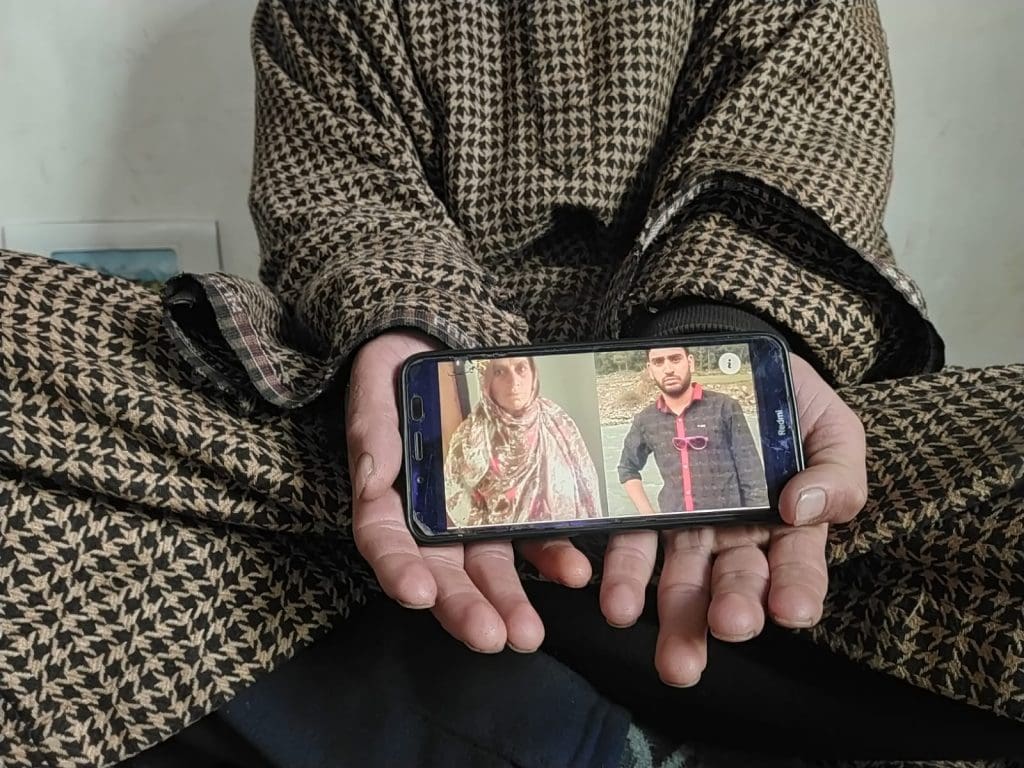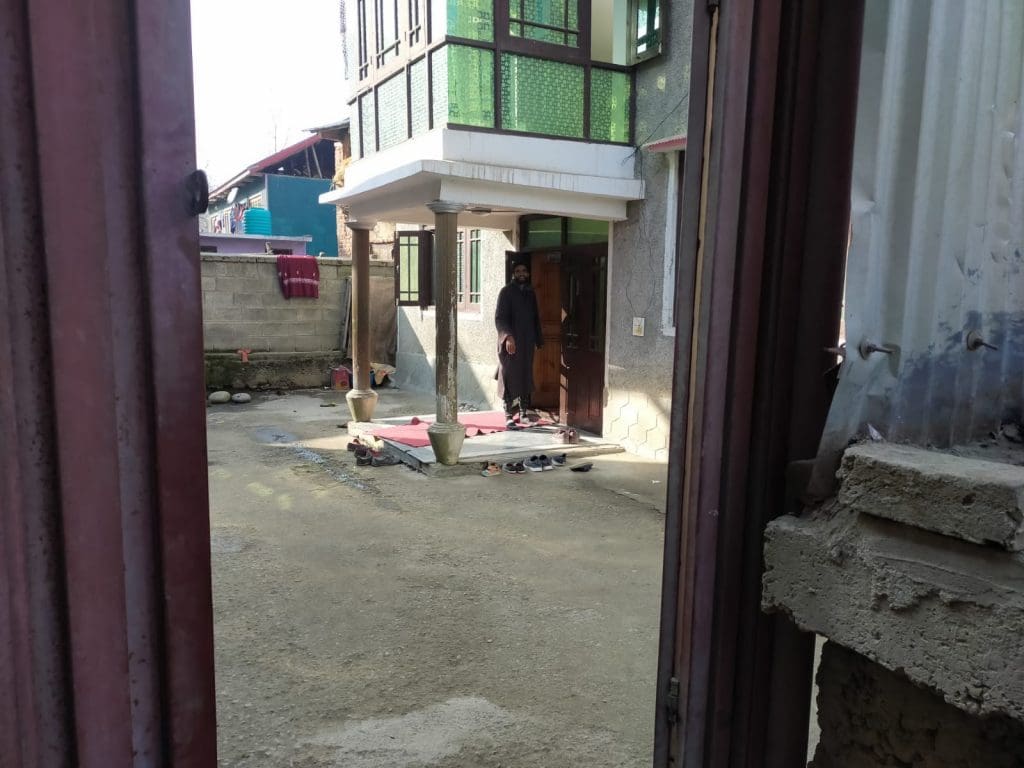
“Mae karnaiwa Aijazs saet mulaqat, be vechan aake laete marne bronth (Can you help me to meet my son Aijaz, I want to see him for the last time)” these were the last words of Muneera Banoo, who died awaiting her incarcerated son past two years and eight months.
Muneera’s son, Aijaz Ahmad Naik is languishing in jail since May 6, 2019, for “harbouring militants”. The mother’s desperate attempt to see her son was in vain as she breathed her last on 11 December.
On 16 December, days after her death, a handful of relatives and neighbours gathered at her house in Zainapora village in South Kashmir’s Shopian district consoling her son Saqib Abdullah, a disabled person.
As Saqib, who is facing psychiatric disorder, kept struggling to recall the dates and days his brother had spent in different jails, a relative broke the silence, “in 2000, their father, Mohammad Abdullah Naik, died in a tragic road accident leaving behind three young kids; two sons and a daughter”.
Muneera shouldered the responsibilities of her family and raised her children in difficult situations hoping they will one day bring an end to her miseries.
After passing 12th class, Khan said, Aijaz quit the school to earn livelihood for his family. “He started a small business venture outside his home after borrowing a mortgage loan from the bank. He was hardly earning two meals when the hopes of a family dashed time and again,” Jahangeer Ahmad Khan, Aijaz’s sister-in-law, told Maktoob.
“After starting the mobile shop, he married off his elder sister and repaired his house,” Khan said, adding he was engaged formally with a girl”.
It has been four and a half years now since they tied the knot.
“It was Aijaz’s mother who would keep his fiancée’s hope alive during these years. But now we don’t even dare to face them,” Khan continued. “Being a woman, it is not that easy to wait for such a long time given the stigmatization and patriarchy of society,” he added.
“Died without seeing her son”
“On that fateful day on 6 May 2019, we were asleep at our home when a cordon and search operations were laid in the vicinity by the security forces,” says Tariq Ahmad, a neighbour. During the search at his [Aijaz’s] home, police detained him and lodged him at a local police station in Zainapora.
“After spending a month there, he was sent to Pulwama jail from where he was shifted to Srinagar Central jail. And from Srinagar, he was taken to Kathua. Later, from Kathua he has again shifted to Central jail, where he is currently lodged,” Tariq told Maktoob.


For almost two years while he [Aijaz] was behind the bars at the Kathua jail, miles away from home. Muneera never visited owing to poverty and lack of support. “ After the court quashed his Public Safety Act (PSA), he was released from Kathua jail after almost two years and she met him in a police station in Zainapora. However, after police booked him in yet another case, she never saw him since then,” he added.
“During these four years, we ran from pillar to post to seek his release. Our mother wished to see her son but no one listened to us and ultimately, she died,” Saqib intercepted and added “she begged for money from neighbours to pay the dues of a lawyer but to no avail, neither he was released nor the debt was paid to them,” he said.
Soon after Aijaz was arrested, it became tough for Muneera to see her jailed son as curfews were imposed in the valley due to abrogation of Article 370.
“After abrogation, the authorities disallowed the prisoners from meeting anyone due to the pandemic,” Tariq told Maktoob.
“After my brother was slapped with UAPA [Unlawful and Preventive Act] some six months before, my mother took me along to Srinagar on 27 November 2021, to meet him, but we were denied on the first sight by the cops at the entrance,” Saqib added.
“The manual in most of the jails allows one meeting of inmates fortnightly with their relatives. We were told that someone had met Aijaz a few days ago”.
After returning from jail, her health deteriorated significantly and she began consuming antidepressants. “During the course of time, all she spoke and thought of was her son, Aijaz. She would often cry in solitude in the longing of her son. She would break down in tears often awaiting to see him back home,” he said.
“she would often tell everyone that she was disallowed to meet her son”.
On 01 December, her health deteriorated and she was hospitalised at SKIMS Soura for special treatment.
“Be vechhan Aijaz aake late, su antoon” [I want to see him last time, kindly bring him],” she would ask repeatedly while struggling to breathe on death bed.
The family wrote an application (a copy of which is with Maktoob) to the district administration seeking his release for time being on humanitarian grounds. But it was denied by the court citing the sensitivity of the case.
“It is very sad that a mother died without seeing her son. And the son is not allowed to shoulder the coffin of his mother. If he [Aijaz] has committed any crime he has been facing the repercussions for the last four years. Now, there is no one to take care of his ailing brother, we demand an honourable court to release him on humanitarian grounds,” Khan added.
Among the family of five, there is none but Saqib and his “nightmarish” memories which continue to haunt him like a “horrifying ghost”.
“I have come to a point in my life where I don’t know how to live with this trauma. I only remain immersed in pain. The departure of my mother and the incarceration of my brother has left me destitute. I just can’t see any hope ahead of me,” Saqib told Maktoob.
“The destiny has struck me badly. I have suddenly become alone and aloof. I have to bear the pain of the separation of my beloved and at the same time have to fight for my brother’s release from jail. I am suffering from mental issues. I have no money, no skill to earn. How can I think of earning a living to sustain myself? How can I proceed with the case of my brother and get him released”? Saqib asks.
I have to live with regret for my remaining life, Saqib said while recalling a Kashmiri proverb, “tsulmut yeye, magar gulmut chene yewan keh” (the missing may come but the dead don’t return).
“We seek his [Aijaz’s] release from jail on humanitarian grounds to save his family from further destitution,” relatives and neighbours present at his home said equivocally.



